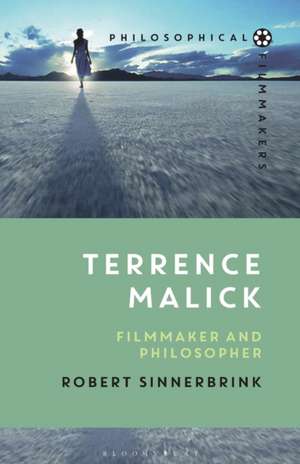Terrence Malick: Filmmaker and Philosopher: Philosophical Filmmakers
Autor Dr Robert Sinnerbrinken Limba Engleză Paperback – 10 iul 2019
| Toate formatele și edițiile | Preț | Express |
|---|---|---|
| Paperback (1) | 159.53 lei 3-5 săpt. | +27.82 lei 6-12 zile |
| Bloomsbury Publishing – 10 iul 2019 | 159.53 lei 3-5 săpt. | +27.82 lei 6-12 zile |
| Hardback (1) | 497.13 lei 6-8 săpt. | |
| Bloomsbury Publishing – 10 iul 2019 | 497.13 lei 6-8 săpt. |
Preț: 159.53 lei
Preț vechi: 173.36 lei
-8% Nou
Puncte Express: 239
Preț estimativ în valută:
30.53€ • 31.76$ • 25.59£
30.53€ • 31.76$ • 25.59£
Carte disponibilă
Livrare economică 21 februarie-07 martie
Livrare express 06-12 februarie pentru 37.81 lei
Preluare comenzi: 021 569.72.76
Specificații
ISBN-13: 9781350063648
ISBN-10: 1350063649
Pagini: 272
Dimensiuni: 138 x 216 x 15 mm
Greutate: 0.34 kg
Editura: Bloomsbury Publishing
Colecția Bloomsbury Academic
Seria Philosophical Filmmakers
Locul publicării:London, United Kingdom
ISBN-10: 1350063649
Pagini: 272
Dimensiuni: 138 x 216 x 15 mm
Greutate: 0.34 kg
Editura: Bloomsbury Publishing
Colecția Bloomsbury Academic
Seria Philosophical Filmmakers
Locul publicării:London, United Kingdom
Caracteristici
Unlike most other films on Malik, this book focuses on his most recent films: The Tree of Life, To the Wonder, Knight of Cups, Song to Song, and Voyage of Time
Notă biografică
Robert Sinnerbrink is Senior Lecturer in Philosophy, MacQuarrie University, Australia. He is the author of Cinematic Ethics (2016), New Philosophies of Film: Thinking Images (Bloomsbury, 2011) and Understanding Hegelism (2007)
Cuprins
Preface Acknowledgements Introduction: Terrence Malick: A Philosophical Cinema? - Malick as filmmaker and philosopher- Can film 'do philosophy'? - Malick's Cinematic Ethics Chapter 1: Approaching Cinematic Ethics: Badlands and Days of Heaven - Badlands: Myth, history, and violence- Days of Heaven: Myth, love, and tragedy- A 'negative' cinematic ethic Chapter 2: Philosophy Encounters Film: The Thin Red Line - What is a 'Heideggerian' cinema?- Malick as phenomenologist of finitude- Malick as cinematic philosopher- The Thin Red Line's 'Vernacular Metaphysics'- The Thin Red Line as Existential Ethics Chapter 3: Philosophy Learns from Film: The New World- Exploring Cinematic Worlds- Romanticism, Nature, Culture- Mythic History and Cinematic Poetry- Exploring Cinematic Romanticism Chapter 4: Cinema as Ethics: The Tree of Life- From 'film as philosophy' to cinematic ethics- The Tree of Life and Cinematic Belief- Aesthetic experience and transformative ethics- Appendix: Voyage of Time Chapter 5: Discourses on Love: Malick's 'Weightless' Trilogy- Malick's 'weightless' or 'faith and love' trilogy (To the Wonder, Knight of Cups, Song to Song)- Love sick: a Kierkegaardian critique- Poetic phenomenologies of loving experience- Myth, Narrative, and Abstraction: the challenge of Malick's late films Conclusion: Malick's cinematic ethics (a philosophical dialogue)- The rationalist sceptic versus the romantic idealist (three questions): 1) How to avoid naïve romanticism, aesthetic pretentiousness, and religious mysticism?2) Malick's 'religious' turn: are his films still philosophical?3) Is a cinematic response to nihilism enough?- Cinematic thinking as ethical experience Bibliography Index
Recenzii
"[An] homage to Malick (b. 1943) and a robust invocation and endorsement of the relation between filmmaking and philosophy . The book is well written and well informed. Summing Up: Recommended. Upper-division undergraduates through faculty."
Robert Sinnerbrink is among the most astute and persistent philosophical interpreters of Terrence Malick's cinematic oeuvre. This detailed and comprehensive survey offers a sure guide to Malick's films as well as to the voluminous critical literature that surrounds it.
For some time now, Robert Sinnerbrink has been arguing that film-philosophy is not simply about aesthetics. To approach a film as a form of philosophical expression, for Sinnerbrink, is to also see it as a site of potential existential, ethical, and even spiritual transformation. Sinnerbrink's masterful treatment of Malick's cinema makes that case eloquently and powerfully. Through his careful, close study of Malick's work, Sinnerbrink challenges his readers to see beyond the dominant and fashionable horizons that inform current discussions about the nature of cinema.
In this rich and important book, Robert Sinnerbrink describes how his sense that cinema can be 'philosophical' has evolved through his engagement with Terrence Malick's challenging and difficult cinematic works from Badlands to Song to Song. Sinnerbrink's wonderfully detailed analyses of how, in each of the films discussed, specific features of Malick's evolving cinematic style engage the viewer in philosophically important 'cinematic thinking' are a model of both exegetical and theoretical insight. Sinnerbrink makes a powerful case for a 'cinematic ethics', whereby cinema can produce an ethical experience capable of transforming us aesthetically, psychologically, and even culturally.
Sinnerbrink has produced an essential (and nostalgic) trip through the responses to Malick's work.
Robert Sinnerbrink is among the most astute and persistent philosophical interpreters of Terrence Malick's cinematic oeuvre. This detailed and comprehensive survey offers a sure guide to Malick's films as well as to the voluminous critical literature that surrounds it.
For some time now, Robert Sinnerbrink has been arguing that film-philosophy is not simply about aesthetics. To approach a film as a form of philosophical expression, for Sinnerbrink, is to also see it as a site of potential existential, ethical, and even spiritual transformation. Sinnerbrink's masterful treatment of Malick's cinema makes that case eloquently and powerfully. Through his careful, close study of Malick's work, Sinnerbrink challenges his readers to see beyond the dominant and fashionable horizons that inform current discussions about the nature of cinema.
In this rich and important book, Robert Sinnerbrink describes how his sense that cinema can be 'philosophical' has evolved through his engagement with Terrence Malick's challenging and difficult cinematic works from Badlands to Song to Song. Sinnerbrink's wonderfully detailed analyses of how, in each of the films discussed, specific features of Malick's evolving cinematic style engage the viewer in philosophically important 'cinematic thinking' are a model of both exegetical and theoretical insight. Sinnerbrink makes a powerful case for a 'cinematic ethics', whereby cinema can produce an ethical experience capable of transforming us aesthetically, psychologically, and even culturally.
Sinnerbrink has produced an essential (and nostalgic) trip through the responses to Malick's work.












